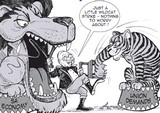
CHEQUEBOOK journalism, the practice of securing exclusive rights to information from a news subject by paying them handsomely for it, is increasingly widely practised in some media quarters, despite ethical concerns about it.
While many look askance at the practice, there is sympathy for those unwittingly caught in the middle of a so-called media circus and who succumb to the pressures of interacting with journalists seeking an exclusive interview.
In a statement issued through their lawyers last week, Barry and June Steenkamp, the grieving parents of slain model Reeva Steenkamp spoke about the difficulty of dealing with many media organisations across the world “who wanted to interview us about our life and precious time with Reeva”.
They said they had been “overwhelmed” by the number of media requests and, as a result, had elected to appoint a British agency to manage the dissemination of their story for a fee.
Paying for stories has always been an option open to journalists since the heyday of muckraking journalism in the 1800s, albeit frowned upon by many practitioners.
Highly competitive British journalists especially are notorious for using any tactic in their attempts to get “the story”, going back to the early political scandals of the 1960s, using lines like “you can tell your story in your own words”.
The most significant payment in recent years of over R10-million reportedly went to Rebecca Loos, who allegedly had an affair with soccer star David Beckham.
The practice has also thrown up a cottage industry in media advisers and nedanger gotiators like Max Clifford who work to get the best payment deals for their clients.
But whipping out a chequebook to pay a news source or subject for a story is not without controversy. As an incentive to perform, chequebook journalism can degenerate into a race to the bottom of journalism ethics, as the need to boost audience ratings and readership figures determine media practices.
There is a sense of emotional blackmail associated with the practice.
The subject buys into the deal in the hope that they can preserve their dignity in the face of whatever traumatic experience they have gone through.
Their hope that they can somehow control the story by using a paying contract with one media house often ends up in tatters as the one who pays the piper generally dictates the tone of the coverage which emerges from the exclusive deal.
And, while it is hard to prove, those critical of paying for stories point to the of news subjects embellishing or even inventing accounts of their experiences in order to curry favour with a sponsor, especially where the story must fit the sponsor’s news genre or agenda.
And there is likely to be little comfort for the subject who thought that “giving in” to a media house dangling a lucrative cheque would keep other media off their backs. The converse is that the rest of the media pack may take a less sympathetic reporting stance towards a subject who has cut an exclusive deal with one journalist, digging into the story angles that may not have been told or glossed over.
Having agreed to an exclusive payment deal, the news subject is regarded as fair game by other journalists.
In some instances, payments to news subjects potentially risk affecting the outcomes of criminal proceedings where those subjects may be called upon to testify. Lawyers have challenged the validity of someone’s testimony in court on the basis that they had been paid to tell their story – or a version of it – outside court.
On the other hand, pointing to Rupert Murdoch’s empire, some argue that these media companies make huge profits off the stories of ordinary people and say it is entirely appropriate that subjects share in the financial rewards of having their story told.
And a critical nexus is “the public” who, despite suggestions that they are appalled by dodgy practices by journalists seeking an exclusive story, lap up every sensational episode of a story unfolding in the media.
Chequebook journalism is not widely practised in South Africa, although celebrity weddings have been targeted by both print and broadcast media with money to offer – and the enticing prospect that an exclusive deal will get the rest of the media pack off the celebrity’s back.
Various professional codes guiding journalists and media organisations in this country prohibit payment for stories to persons “involved in crime”. But where professional practice codes exist, more often than not they are ignored.
It’s unlikely the practise will simply disappear, as some journalists argue that the ends may justify the means, especially in a story which, allegedly, has strong public interest.
Invariably, however, news that may be in the general public’s interest to know is confused with news which may simply be interesting and even titillating to some.
The case of a newspaper paying racist killer Barend Strydom for an interview in 1988 is often raised as the most significant example of chequebook journalism in this country.
Wits University journalism researcher Susan Stos suggests though that the limited examples of paid-for news stories points to South Africa’s relative protection by virtue of its distance from international markets where the practice is the norm or the “relative lack of competition” among media organisations in this country.
She has argued that local journalists need to reflect on “their responsibility to be accountable, encourage dialogue about methods used and educate the public about the process of journalism”.
Ray Hartle is a writer based in the Eastern Cape. He studied at Rhodes University
Source: Daily Dispatch
